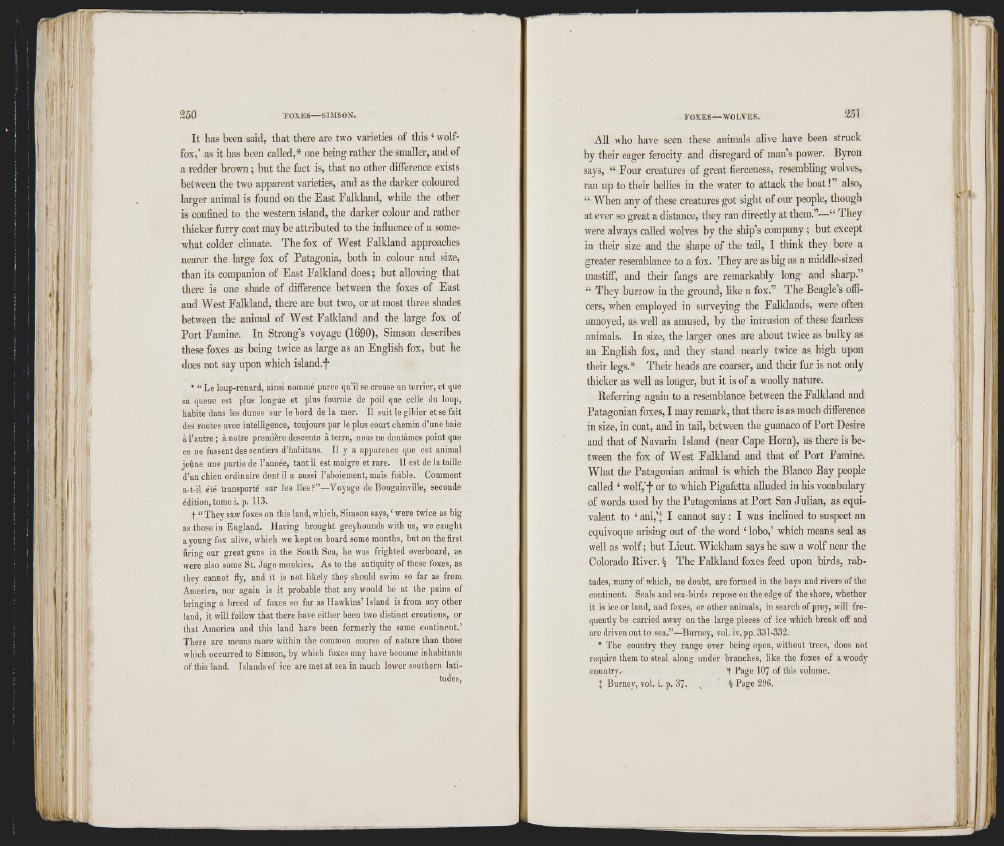
l 'h
!|*r =
It has been said, that there are two varieties of this ‘ wolf-
fox,’ as it has been called,* one being rather the smaller, and of
a redder brown ; but the fact is, that no other difference exists
between the two apparent varieties, and as the darker coloured
larger animal is found on the East Falkland, while the other
is confined to the western island, the darker colour and rather
thicker furry coat may be attributed to the influence of a somewhat
colder climate. The fox of West Falkland approaches
nearer the large fox of Patagonia, both in colour and size,
than its companion of East Falkland does ; but allowing that
there is one shade of difference between the foxes of East
and West Falkland, there are but two, or at most three shades
between the animal of West Falkland and the large fox of
Port Famine. In Strong’s voyage (1690), Simson describes
these foxes as being twice as large as an English fox, but he
does not say upon which island.-)-
• “ Le loiip-renard, ainsi nommé parce qu’il se creuse un terrier, et que
sa queue est plus longue et plus fournie de poil que celle du loup,
habite dans les dunes sur le bord de la mer. Il suit le gibier et se fait
des routes avec intelligence, toujours par le plus court chemin d’une baie
à l’autre ; à notre première descente à terre, nous ne doutâmes point que
ce ne fussent des sentiers d’habitans. Il y a apparence que cet animal
jeûne une partie de l ’année, tant il est maigre et rare. Il est de la taille
d’un chien ordinaire dont il a aussi l’aboiement, mais foible. Comment
a-t-il été transporté sur les île s? ”—Voyage de Bougainville, seconde
édition, tome i. p. 113.
f “ They saw foxes on this land, which, Simson says, ‘ were twice as big
as those in England. Having brought greyhounds with us, we caught
a young fox alive, which we kept on board some months, but on the first
firing our great guns in the South Sea, he was frighted overboard, as
were also some St. Jago monkies. As to the antiquity of these foxes, as
they cannot fly, and it is not likely they should swim so far as from
America, nor again is it probable that any would be at the pains of
bringing a breed of foxes so far as Hawkins’ Island is from any other
land, it will follow that there have either been two distinct creations, or
that America and this land have been formerly the same continent.’
There are means more within the common course of nature than those
which occurred to Simson, by which foxes may have become inhabitants
of this iand. Islands of ice are met at sea in much lower southern latitudes,
All who have seen these animals alive have been struck
by their eager ferocity and disregard of man’s power. Byron
says, “ Four creatures of great fierceness, resembling wolves,
ran up to their bellies in the water to attack the boat! ” also,
“ When any of these creatures got sight of our people, though
at ever so great a distance, they ran directly at them.”—“ They
were always called wolves by the ship’s company ; but except
in their size and the shape of the tail, I think they bore a
greater resemblance to a fox. They are as big as a middle-sized
mastiff, and their fangs are remarkably long and sharp.”
“ They burrow in the ground, like a fox.” The Beagle’s officers,
when employed in surveying the Falklands, were often
annoyed, as well as amused, by the intrusion of these fearless
animals. In size, the larger ones are about twice as bulky as
an English fox, and they stand nearly twice as high upon
their legs.* Their heads are coarser, and their fur is not only
thicker as well as longer, but it is of a woolly nature.
Referring again to a resemblance between the Falkland and
Patagonian foxes, I may remark, that there is as much difference
in size, in coat, and in tail, between the guanaco of Port Desire
and that of Navarin Island (near Cape Horn), as there is between
the fox of West Falkland and that of Port Famine.
What the Patagonian animal is which the Blanco Bay people
called ‘ wolf,’! o*’ ''vhich Pigafetta alluded in his vocabulary
of words used by the Patagonians at Port San Julian, as equivalent
to ‘ ani,’] I cannot say : I was inclined to suspect an
equivoque arising out of the word ‘ lobo,’ which means seal as
well as wolf; but Lieut. Wickham says he saw a wolf near the
Colorado River. § The Falkland foxes feed upon birds, rabtudes,
many of which, no doubt, are formed in the bays and rivers of the
continent. Seals and sea-birds repose on the edge of the shore, whether
it is ice or land, and foxes, or other animals, in search of prey, will frequently
be carried away on the large pieces of ice which hreak off and
are driven out to sea.”—Burney, vol, iv, pp. 331-332,
• The country they range over being open, without trees, does not
require them to steal along under branches, like the foxes of a woody
country. t Page 107 of this volume.
X Burney, vol. i. p, 37. , § Page 296.
i i
f